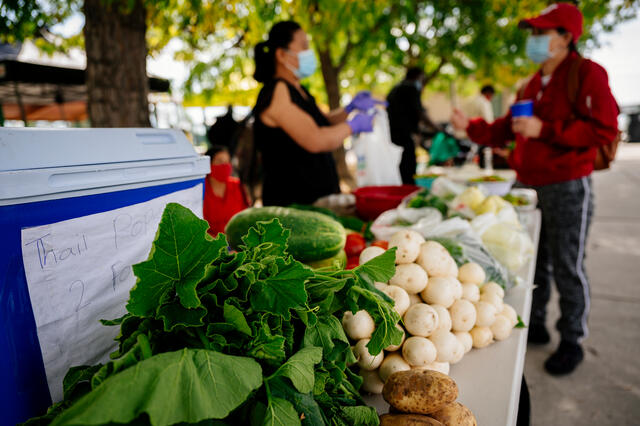Summer is the peak of the growing season at New Roots, a multi-faceted agrarian program of the International Rescue Committee (IRC) in Salt Lake City that connects refugees and new Americans with community gardens and urban farmland while striving to combat food insecurity in local communities. Through two land leases provided by Salt Lake County, farmers from refugee, immigrant, or disadvantaged backgrounds are able to grow a diverse range of crops – some varieties not otherwise found in Utah and connect their communities to markets where fresh produce is accessed at an affordable rate.

At one of three New Roots-operated farmer’s markets, farmers sell produce directly to consumers each week. The most advanced farmers are earning supplemental income through wholesale partnerships with businesses like Whole Foods and the Community Supported Agriculture (CSA) program, a weekly produce subscription box for the duration of the growing season.
The produce that ends up in the weekly CSA boxes comes from Wheadon Farm, where the majority of the 13-acre property is farmed by three entrepreneurs. Customers who purchase produce through the CSA program pay upfront for a set number of weeks for the summer.
“That’s really nice for the farmers because it guarantees a market for the farmers’ produce, and it’s nice for the customer too because it’s a way to invest in a farmer that’s local, and support organic agriculture,” explains Elizabeth Watt, New Roots logistic specialist. Elizabeth works closely with the farmers growing at Wheadon Farm and has seen firsthand the benefits that farming has brought to some of the families. “Supplemental income is huge,” she remarks, continuing to share about a farmer whose income from selling produce through the CSA and wholesale programs is able to carry his family through most of the winter.
Another family, Hawaa and her husband, also grows at the Wheadon Farm. Hawaa’s family was able to buy a car with the income they earned by participating with New Roots. “If we didn’t have the farming, we wouldn’t have the car,” Hawaa says. Hawaa and her husband have six kids together, so no longer relying on public transportation has been significant.
Originally from Sudan, Hawaa is grateful to have the opportunity to continue growing some of the same vegetables she used to grow before arriving in the United States. While she loves being able to grow produce and earn an income, working outside in the hot summer weather can be grueling. “It’s hard work,” she says, “but it’s okay. If you didn’t work hard, you wouldn’t have money.”
According to Margot Draeger, New Roots farmer empowerment coordinator, those dedicated to their farm plots often see economic growth each year. Margot says that she has noticed how farmers learn new business skills each year and become savvier with their farm practices to make the most income. Still, most New Roots entrepreneurs have other jobs outside of farming to support their families. “That’s what’s great about the [Sunnyvale Farmers Market], most people are available on Saturdays if they are working a Monday to Friday job,” Margot shares.
To support the farmers growing with New Roots, you can purchase produce until mid-October directly from the farmers at one of three farmers markets that operate on Wednesdays and Saturdays Visit NewRootsSLC.org to view the full calendar and learn more about supporting New Roots entrepreneurs.
